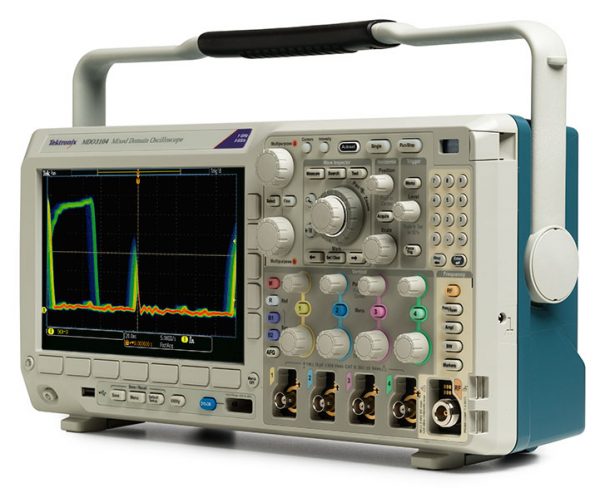Tektronix MDO3102 1 GHz Two-Channel Mixed Domain Oscilloscope
Manufacturer: Tektronix
Model Number: MDO3102
The Tektronix MDO3102 Mixed Domain Oscilloscope is the ultimate 6-in-1 integrated oscilloscope that includes an integrated spectrum analyzer, arbitrary function generator, logic analyzer, protocol analyzer, and digital voltmeter/counter. The Tektronix MDO3102 is completely customized and fully upgradable; Add the instruments and performance you need now - or later. At the core of the Tektronix MDO3102 is a world-class oscilloscope, offering comprehensive tools that speed each stage of debug - from quickly discovering anomalies and capturing them, to searching your waveform record for events of interest and analyzing their characteristics and your device's behavior. Digital phosphor technology with FastAcq high-speed waveform capture. To debug a design problem, first you must know it exists. Every design engineer spends time looking for problems in their design, a time-consuming and frustrating task without the right debug tools. Digital phosphor technology provides you with fast insight into the real operation of your device. Its fast waveform capture rate - greater than 280,000 wfm/s with FastAcq - gives you a high probability of quickly seeing the infrequent problems common in digital systems: runt pulses, glitches, timing issues, and more. To further enhance the visibility of rarely occurring events, intensity grading is used to indicate how often rare transients are occurring relative to normal signal characteristics. There are four waveform palettes available in FastAcq acquisition mode. The Temperature palette uses color-grading to indicate frequency of occurrence with hot colors like red/yellow indicating frequently occurring events and colder colors like blue/green indicating rarely occurring events The Spectral palette uses color-grading to indicate frequency of occurrence with colder colors like blue indicating frequently occurring events and hot colors like red indicating rarely occurring events. The Normal palette uses the default channel color (like yellow for channel one) along with gray-scale to indicate frequency of occurrence where frequently occurring events are bright. The Inverted palette uses the default channel color along with gray-scale to indicate frequency of occurrence where rarely occurring events are bright. These color palettes quickly highlight the events that over time occur more often or, in the case of infrequent anomalies, occur less often. Infinite or variable persistence choices determine how long waveforms stay on the display, helping you to determine how often an anomaly is occurring.

